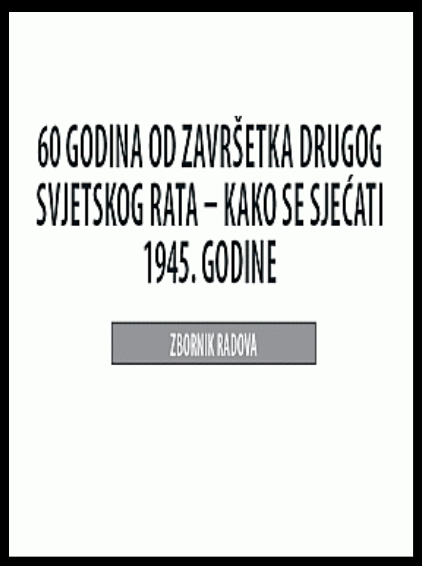Posljednji mjeseci ratnog perioda: Sarajevska Iskustva
The last months of wartime: Sarajevo´s preparations
Author(s): Emily Greble Balić
Subject(s): History, Military history, Recent History (1900 till today), Special Historiographies:, WW II and following years (1940 - 1949), History of Communism, Historical revisionism, Fascism, Nazism and WW II
Published by: Institut za istoriju
Summary/Abstract: In this article, Emily Balić examines social conditions in Sarajevo during the final months of World War II. By January 1945, a constellation of factors including the Croatian state’s inability to monitor local governments or distribute resources; the German occupation; and the refugee crisis created by the Yugoslav civil war, had rendered Sarajevo’s local government nearly bankrupt and totally ineffective. To fill this leadership void, private clubs and societies (“društva”) took over important social services. The društva had their own financial and material resources from membership dues, private donations, and the strategic takeover of property and businesses during the war. Run by small groups of community elites with close ties to local politicians and religious leaders, the društva had access to thousands of Sarajevans through religious, cultural, and political circles. They organized schools, lectures, and exams, distributed food, and built and maintained refugee camps and children’s homes. Moreover, they were the principal liaison between Sarajevo’s citizens and the government, a position they used to shape local policy, mold public attitudes, and preserve social mores and conservative values as the war drew to a close. When the Communist Partisans arrived in Sarajevo, they allowed many of the društva (albeit with new leadership) to continue their work in the city in order to maintain order. Thus, the društva served as an important bridge from fascism to Communism and from the dying Independent State of Croatia to the emerging Yugoslavia.
Book: 60 godina od završetka Drugog svjetskog rata: kako se sjećati 1945. godine
- Page Range: 131-144
- Page Count: 14
- Publication Year: 2006
- Language: Bosnian
- Content File-PDF

